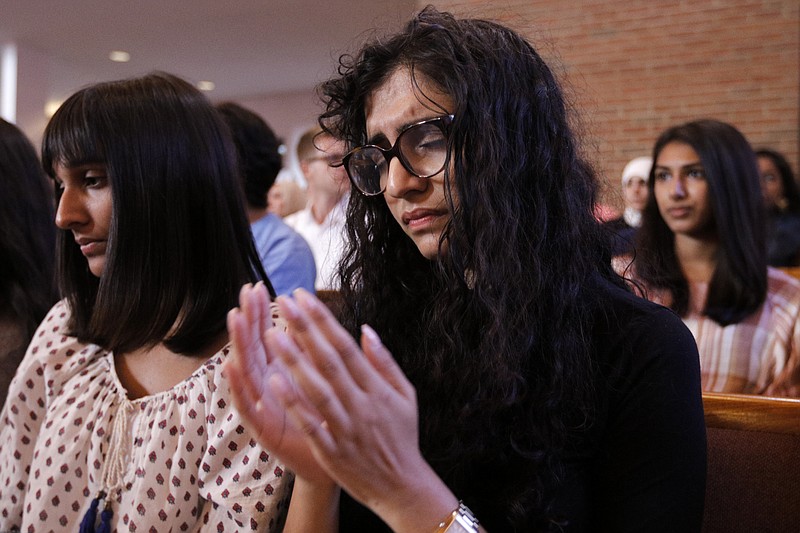Forty-five minutes into their presentation on Islam, the Quran and terrorism, Bassam Issa, a local Muslim leader, and Boyd Patterson, an assistant district attorney, turned to the crowd. Time for questions.
Up until then, the evening had been thoughtful and warm.
Patterson had invited the crowd of 50 or so to the downtown library after recently publishing a mini-book that asks: what are the verses that inspire terrorism, and how can we differentiate between nonviolent and violent Islam?
Cue Issa. In a gray suit and white shirt, Issa greeted the crowd - "In the name of God the gracious and merciful" - with a brief lecture that was part history lesson, part Quran 101.
In short? Context matters. Verses that call for slaying infidels originated centuries ago as a sort of self-defensive posture against attackers of early Islam, which also fought against subjugation of women and children, and for forms of social justice.
Gently, he also reminded us that violent verses are not exclusive to the Quran. (The Bible calls for stoning women, slaughtering children, purging of evildoers.)
Finally, Issa mentioned the 1.5 billion Muslims in the world, and how only the thinnest fraction become terrorists.
"Islam has something to do with it in the sense that these verses are taken out of context," he said. "But the initial reasons? Being poor. Having oppressive governments. Being preyed on by certain people to recruit you to become a terrorist."
Then, question time.
It began with a man in the back of the room. Then another. And another.
And an evening that had once been fragrant soon soured.
The men? It was both what they said - Christianity is the better religion and Islam will soon take over the West and the violence of Mohammed continues to this day - and how they said it. Insulting. Antagonistic.
One man told Issa his nonviolent Quranic interpretation meant nothing, as violent jihadists only cancel and drown it out.
"As they come to America and begin to attack our country, as they already have in Chattanooga, your interpretation is totally irrelevant," he said.
During his question, which seemed more like a statement, the man, a local Tea Party leader, also also trotted out statistics - a quarter of Muslims agree with suicide bombings, and how 11 percent of Muslim youth in Paris supported the recent attacks.
Turns out, both stats are fishy. One is eight years old; the other, nine. Both were taken out of context from bodies of larger research.
Left unsaid by the man was other recent data, like last month's Pew Research Center poll showing an overwhelming majority of global Muslims - 100 percent in Lebanon, 94 percent in Jordan, and so on - have negative, unfavorable views of ISIS.
Let me be clear: I'm not minimizing the Islamic hideousness of ISIS.
Yet Monday night reminded me that many of us come into the ISIS-debate with baggage, already prejudiced and angry at Muslims, already closed in our hearts toward The Other.
On a subconscious level, it's as if some of us are strangely satifised with ISIS, as it confirms our worst fears and suspicions. Thankful to have such an extreme enemy, we are now free to generalize against all Muslims.
It is one thing to oppose violent jihad. It's quite another to do so without any personal history of understanding diversity, welcoming the stranger, or acting humble before other religions.
All this talk of peaceful Christianity? No, we aren't beheading anyone, yet we routinely abandon the clear call of Christ to lay down our arms - handguns, assault weapons, nuclear weapons, drones, our weaponized hearts - to build a beloved community.
American Christians befriend the hawk while crucifying the dove. We imprison and execute our own people. We embrace an economy that oftens treats Creation and its resources like a playground-plaything. We support a government that exports more weapons than any government on earth. We have built a society now afflicted by mass shootings.
If we worship the Prince of Peace, where is our anti-war protest? To talk of Muslims who may support suicide bombings as an act of defense yet to ignore our long history of warfare, which always involves the killing of civilians, is to commit both spiritual and logical hypocrisy.
Yes, Christ is markedly different from Mohammed.
So, too, are many American-Christians from Christ.
As am I.
Let me pull the plank out of my own eye. I have tried to scrub the anger and bitterness out of this column today, but failed. I continue to harbor ill-will and violence in my own heart, in ruinous ways. (He who calls his brother a fool is bound for hell, Jesus said.)
To reduce violence and terrorism, we cannot forget where it often begins.
Our own hearts.
Contact David Cook at dcook@timesfreepress.com or 423-757-6329. Follow him on Facebook at DavidCookTFP.

